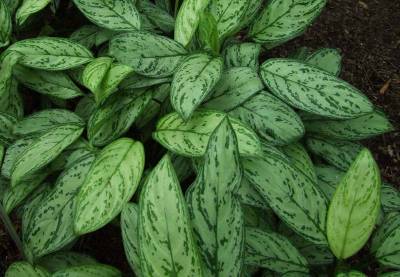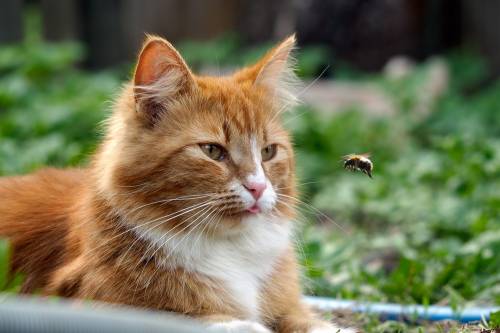
Connect with a verified veterinarian in minutes. Licensed vets are available 24/7 to answer your questions. No need to worry about your furry family member.
Cats occasionally are interested in houseplants, sometimes to the point of trying to eat them. Has your cat tried to eat your Chinese Evergreen? Then you may want to read this.
What is Chinese Evergreen?
Chinese evergreen plants are tropical Asian plants that are commonly used as a houseplant.These plants even produce small, white flowers that look something like the flower you see on a peace lily.
Chinese evergreen plants are also commonly called by these names: Aglaonema, diamond boy, emerald boy, moonlight bay, stripes, Philippine evergreen, and poison dart plant. Their scientific name is Aglaonema spp.
Chinese Evergreen is Toxic to Cats
Unfortunately, Chinese evergreens are toxic to cats. This is due to the substance they contain, which is insoluble calcium oxalate. This substance is a type of crystal, which is created by the plant as a defense against insects that eat plants.
When the crystals are ingested, right away they pass into the oral tissues. The crystals can then cause pain, burning, and irritation. They can also cause irritation of the digestive tract. And in some rare cases, calcium oxalate crystals can cause swelling of the upper airway, which can make breathing difficult. It is important to contact your veterinarian immediately if you suspect your pet may have eaten some Chinese evergreen plant.

Review symptoms, medications & behavior to keep your pets healthy with a Vet Online in just minutes.
Ask a Vet Live NowWhat Are The Symptoms of Chinese Evergreen Toxicity in Cats?
You may notice these symptoms if your cat has eaten some Chinese evergreen:
- Excessive drooling
- Pawing at the mouth
- Decreased appetite
- Vomiting
- Oral irritation
- Swelling of the mouth, tongue, or lips
- Difficult swallowing
- Difficulty breathing
If you know or suspect your cat has eaten Chinese Evergreen, then you should call the vet right away. If your cat is having breathing difficulties, then this is a medical emergency.
Treatment for Chinese Evergreen Toxicity in Cats
There’s no specialized treatment or antidote for Chinese evergreen toxicity in cats. The vet will perform a physical exam and may also do lab work (run blood tests). After this, they will treat the cat’s symptoms and remove any part of the plant that may remain in the cat’s mouth. They may advise hospitalizing your cat on IV fluids (a drip) to help support their recovery. In addition, medications may be used to help with vomiting and pain. You cat may also require additional medication if they are having breathing difficulties.
In most cases, cats completely recover with no ill effects. The sooner your pet receives veterinary care after eating Chinese evergreens, the better their chance of making a full recovery is.
If your cat seems to have a penchant for eating Chinese evergreen plants, then it’s a good idea to move the plant to a space your cat isn’t able to access. Just to be on the safe side!
Connect with a verified veterinarian in minutes. Licensed vets are available 24/7 to answer your questions. No need to worry about your furry family member.

Evie Moloney, RCVS
This article has been reviewed and approved by an independent Veterinarian: Evie is a vet surgeon who graduated from the University College Dublin, which is the only university offering the veterinary medicine degree in Ireland. She really enjoys surgery and has also worked as an emergency and critical care vet. She is passionate about sharing education about preventative health care for pets, especially the importance of regular dog and cat teeth brushing at home. She also enjoys helping owners find practical solutions for keeping pets as comfortable as possible while living with conditions such as arthritis. When not working, she enjoys hiking and swimming.
Review symptoms, medications & behavior to keep your pets healthy with a Vet Online in just minutes.
Ask a Vet Live Now




